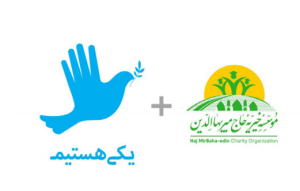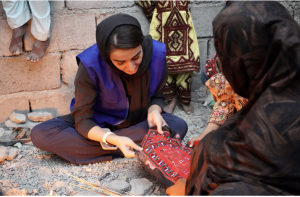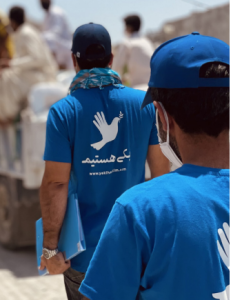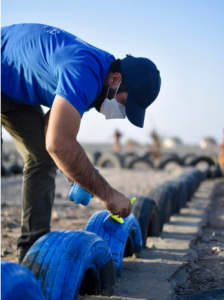By: Ghazal Mostafa
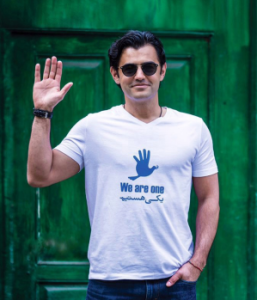 Reza Abedini, born in 1980, is the founder of “YEKI HASTIM” (We are One) nongovernmental organization. Although he was active for over 10 years in the business world, Abedini left his professional life several years ago to pursue his personal interest of the “culture of peace” around the world. To spread his message, he went on long walks of hundreds of kilometers in various continents, among them spending 3 months in four countries in South America and another almost 4 months in eight countries in Africa. When not walking, Abedini was engaged in charity activities that involved world peace. For Abedini children are both the builders and the inheritors of the world’s future and as such, they are important and deserve attention. Based on this core belief, Abedini next started a movement he called “Children of Peace” for which he travelled the world over as its ambassador.
Reza Abedini, born in 1980, is the founder of “YEKI HASTIM” (We are One) nongovernmental organization. Although he was active for over 10 years in the business world, Abedini left his professional life several years ago to pursue his personal interest of the “culture of peace” around the world. To spread his message, he went on long walks of hundreds of kilometers in various continents, among them spending 3 months in four countries in South America and another almost 4 months in eight countries in Africa. When not walking, Abedini was engaged in charity activities that involved world peace. For Abedini children are both the builders and the inheritors of the world’s future and as such, they are important and deserve attention. Based on this core belief, Abedini next started a movement he called “Children of Peace” for which he travelled the world over as its ambassador.
Soon his message became a beacon of hope among a large group of his followers which in turn attracted the attention of large national companies who wanted to sponsor his charitable efforts. Having secured financial support from corporations, Abedini then expanded “Children of Peace” into an international social movement and called it “We Are One” (Yeki Hastim). A few years ago, with endorsement of Abedini’s Yeki Hastim campaign by the United Nation’s Tehran branch and with financial support from Eghtesad Novin Bank of Iran, successful art exhibitions fundraising events were held with the participation of prominent Iranian artists and performers. Also, as the campaign drew more international recognition for social responsibility and citizenship, Abedini was invited by Samsung to be a torchbearer at the 2018 Winter Olympics in South Korea.
Thank you so much for giving Trends this exclusive interview. Please tell us about yourself and your background. How and why did you start the “We Are One” (Yeki Hastim) NGO? What in your own background prepared you to lead this organization?
I am Reza Abedini Sohi and I was born in 1980. My education and training are as a textile engineer, and I worked in this field for about ten years. During that time, I was running a textile factory which was actually our family business. Although our factory was in Iran, because of my personal interests in social responsibility, I went to Afghanistan and started a textile factory there with the help of the Afghan people. My aim was to help locals be independent and eliminate their need for importing goods. As an individual, from a very early age, I have always loved traveling to different corners of the globe but due to work engagements I never had the time. So after ten years of working at our family business, I decided to quit my job and follow my childhood dream of traveling around the world. During these travels I saw many people and cultures close up which made me think about peace and about spreading the culture of peace. As a result, I decided to travel to different countries on foot because this way I would encounter more people with the opportunity to talk to them about peace face to face, to raise awareness about the importance of peace and its effects on their lives and their children’s lives. I travelled to many different places around the world. For example, I spent 6 months in Eastern Asia where I walked for approximately 300 kilometres.
After that there was South America where I covered about 500 kilometres in 3 months and Africa where I was for around 3 months and I walked 600 kilometres, and many other places. During these trips, I worked as a volunteer for numerous local NGOs and for me these opportunities served as a personal enlightenment. After a while I realised this feeling was more of a social responsibility for me towards my surroundings. I realised that by doing this work I could find the true “Reza” and I could help build a better world starting with my own environment. These travels caught the attention of the media and soon many people in Iran. And my trip to Africa caught the attention of the United Nations Headquarters in Iran. I was invited to work with the UN offices here and hold an exhibition on peace on International Peace Day. This exhibition became the starting point for the concept of Yeki Hastim (We Are One). Very slowly this personal campaign turned into a social phenomenon and companies, magazines, newspapers and the media started to take interest in the campaign by promoting it. It didn’t take long before this national interest in my personal crusade resulted in the actual formation of Yeki Hastim (We Are One) organization in the form that I had in mind. My teammates and I worked hard for it to have the right slogan with the right message. We formed the campaign with the moto of “We are different, but we don’t have differences – We Are One”. It was after this that Yeki Hastim was approached by large corporations such as Pars Online and many others who sponsored my travels, and soon I became a fulltime social activist. Samsung company in Iran chose me to be one of the carriers of the Olympic Torch for the Winter Olympics in 2018 which were held in Korea. That was a once in a lifetime and unique experience. After the Olympic games, sadly because in Iran there are many natural disasters, I found myself spending more and more time on my social responsibilities around the country where needed.
Although Yeki Hastim started as a personal mission, it is now a larger organization. How does it fit in the Iranian society as an NGO?
I started Yeki Hastim as a traveling campaign to spread a message around the world. But because we have experienced a lot of natural disasters such as flood and earthquakes around our own country, it has also assumed a very active role encompassing social responsibilities in Iran. This also proved to be a challenging effort for one person and that’s why I decided to create an organization comprised of like-thinking people who could more effectively take on bigger and more demanding social projects around the country. Yeki Hastim is now a charitable organization and officially recorded with the Iranian Welfare Organization under registration number 953 since 2019. Being an official organization is important because we believe that countries evolve in a positive way when they have many different social organizations and NGOs. This is because first of all they can enable citizens to work together voluntarily to encourage social value;, secondly, they can do specialized work in different fields; and thirdly they can promote local initiative and problem solving.
What is the organization’s mission and strategy? Which region(s) of Iran are you active in and what do you do there? Are there other NGO’s you work with? Where do you get your funding from?
Considering the fact that we are a fairly new and young organization that was only established three years ago, we have tried to be an innovative and pragmatic NGO. We accomplish this goal by being present in the field. We also categorize our work in two parts, one being the short-term urgent help needed when there is a natural disaster by sending out food or hygiene supplies. And the second being our long-term infrastructural development projects such as building schools, libraries and health centeres. Currently the place we have chosen to work in is the south-eastern region of Iran, in an area called Jazmourian. This area is located in the south of Kerman province on the border of Sistan and Balouchestan province and it is an extremely poverty-stricken area. The main work we are doing there is helping with the development of sustainable villages. We believe that in order for the country to progress we need to go to villages and start development from there. I am sure that when villages are developed and enhanced, the whole area will benefit and, better yet, this can have a lasting effect on the children and the future of the country as a whole. For this, we work hand in hand with other organizations on different levels, although in that particular region there are almost no other charities and that’s why we haven’t been able to team up with any other NGO’s. As I said, we will succeed as a nation only when we can have developed villages in different impoverished corners of the country, so that the children and the people have an opportunity to live in developed and progressive environments with the proper infrastructures needed to grow and improve as individuals. Having numerous such areas in different corners of Iran will help the nation as a whole to use its talents and move forward. We are hoping that we can reach our goal with the help of local people as well as benefactors around the country. We receive donations from ordinary people and different companies which have Corporate Social Responsibility (CSR) on their agenda. We encourage companies to help fund us using their advertising budgets and we in return provide them with content that can be used as advertisement. We appreciate that companies must promote themselves and their brands through their charitable donations to create brand-faithful customers.
The Importance of Business Coaching for any Organization
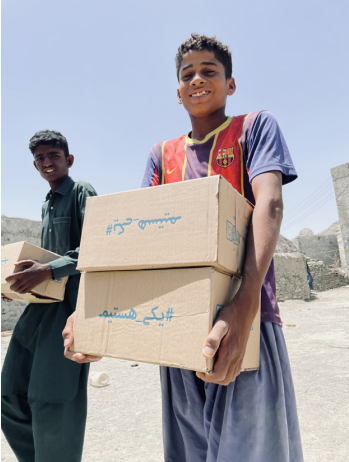 |
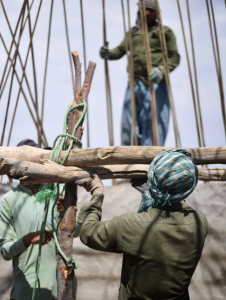 |
What are the most important issues facing your organization today? What plans are in place or are being developed to address these challenges? What change or outcome are you seeking (or, what is the unmet need you are addressing)? How has the Covid-19 pandemic affected the organization and your activities?
As I mentioned earlier, one of our main interests is in working on the infrastructure of regions, which has long term results. Unfortunately, because people not living in the region are not emotionally invested in such programs, it is much more difficult to raise the funds needed, which is a problem. People seem to be more interested in short term issues with quick results, such as elimination of hunger and disease. When it comes to building playgrounds, schools or health centers, because these sorts of projects are time-consuming and don’t seem urgent, donors are less willing to help. This is cause for concern as we have trouble finding necessary funds. Part of our mission at Yeki Hastim is to create an atmosphere in which charitable donations become part of the culture of our people. We want to educate and remind people, companies and organizations that we all have a social responsibility towards the wellbeing and prosperity of our own country and our fellow citizens. We hope that day by day we can see this message and mindset flourish, especially among the younger generations and companies. Another difficulty is traveling to the area where we are working as it is very remote, located approximately 1,300 kilometres from Tehran. In order to reach it we have to go to Bandar Abbas or Kerman and from there travel by jeep for 5 hours through unsafe dirt roads to reach the village and even change cars to get to the other locations. In general, these areas are extremely remote, and the climate is harsh. The temperature sometimes reaches 60 degrees Celsius in summertime, which takes its toll on the team members.
Once a Mahak Child, Always a Mahak Child
There is not even one shower or proper toilet in the village and daily access to running water is for only two to three hours and this water is not even clean. All this makes it very tough for the team. Finding the building material needed for our work in the region is problematic, and plus, filming and creating content for our social media sites is difficult as we have to take photographers and cameramen there which, considering the climate and the production cost, makes it almost impossible The Covid-19 pandemic caused major additional problems too of course as people became more dependent on aid, with the poor becoming poorer. At the same time because of the economic issues exacerbated by the pandemic, the companies that were helping our organization had to decrease their donations and this has naturally affected our work and our goals. We have set up projects to provide help to Sistan and Balouchestan province for Covid-19 which include sending much needed medical supplies and help to hospitals and health centers. Working hand in hand with other NGOs we were able to reach a zero-death day recently, and from being a black and red region of the pandemic in the country, the area is now gone down to the yellow level. Today they have the lowest rate of Covid-19 and deaths in all across Iran and this is an accomplishment we are all proud of.
How have your programs improved, grown or changed over time? How do you use outcome data and feedback to improve programs and make decisions? How are you addressing your funding issues? What results are you after?
In order to reach our long-term goals, we are constantly learning new methods. For instance, our team is trying to change the way people look at charities from a one-sided approach to a more interactive one. We want to get companies and organizations to provide large and meaningful donations so that they, and not individual people, are the main donors. This is a very difficult task because it’s at times difficult to show the result of our work which is not only building the infrastructure but also the soft part of making a difference at local cultural levels. But the lack of interest is not only from corporations and donors who are not from the area. We also have pushback from locals to get involved in our projects. However, we are hopeful that as time goes by and we have more to show as far as the difference we can make, the better our reception will be both from the locals as well as donors of all sizes and amounts. We have been working for three years and we are very happy with the results to date.
What message do you have for the readers?
When we started out, we didn’t even have an office. We would go to the houses of friends or volunteers, who would let us use their homes and residences for days while they were living there themselves. Today we have our head office in Tehran, an office in Zanjan and employees who work full time on the projects. We hope to fulfil our goals with the help of people and get our voice heard. I ask the readers of this interview to visit our website and our page on Instagram, or contact our offices in Tehran or Zanjan to get any information they need. The help of individuals and companies, whether financial or just spreading the word, is much appreciated.
@Yekihastim.ngo
+98 21 2275 3953 (Tehran)
+98 91 2136 2404 (Tehran)

